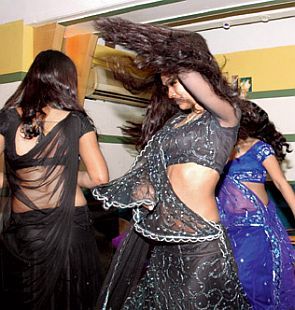 The Justice C S Dharmadhikari Committee, set up to recommend measures to curb crimes against women, has asked Maharashtra government to enforce a "complete ban" on dance bars and frame a policy to check "vulgarity" on social networking sites such as Facebook.
The Justice C S Dharmadhikari Committee, set up to recommend measures to curb crimes against women, has asked Maharashtra government to enforce a "complete ban" on dance bars and frame a policy to check "vulgarity" on social networking sites such as Facebook.
These suggestions by the state government-appointed panel are contained in its fourth and fifth interim reports submitted to the Bombay High Court on a PIL seeking measures to ensure safety and security of women.
The committee, while recommending a complete ban on bar dance, has noted there was a drop in cases of atrocities against women when the state had banned dance bars.
"This committee is of the view that there should be a complete ban on bar dancers in hotels and restaurants. We recommend that a new law many be introduced after considering the suggestions given by the Supreme Court in its judgement."
In 2012, the Supreme had held the ban on dance in bars as unconstitutional.
Maharashtra Assembly had on June 13 this year passed a Bill to extend the ban on dance performances at high-end hotels and a host of other public premises, bringing to end a protracted legal battle over the issue which had generated a heated debate on moral policing.
In 2005, in a controversial decision, dance performances in the bars in the state had been banned, but performances at three-star and higher-standard hotels had been exempted. The government could not defend this discrimination when the ban was challenged in the Supreme Court, which had called it discriminatory.
The committee also said that social networking sites such as Facebook are responsible for increase in divorce cases and harassment of women, besides developing violent tendencies among the youth.
"Vulgar activities on Facebook and such other social networking sites, mobiles and computers should be monitored and tackled urgently as it was observed the world over that divorce cases are on rise in marriages taking place through such medium."
"Such sites fuel violent tendencies among the youths and as such there is increase in cases of crime against women," the Dharmadhikari panel said in its report.
It said criminal tendencies among children are also increasing because of this and recommended that the state should a frame a policy in this regard.
Among the 22 recommendations in its fourth interim report and six suggestions in its fifth report submitted to HC by the government two days ago, the panel has advised that at the time of registration of marriage, the bride must be asked to disclose on oath whether dowry was demanded and that all the laws for protection of women were followed.
"Also, the bride must declare whether all gifts and cash received by her were kept in her name by the family," the committee said.
These measures would go a long way in making the anti-dowry law more effective, the panel, which was set up in 2010, said.
The committee asked the state to frame a policy to deal with 'Jat Panchayats' (caste councils) which ostracise or punish couples for inter-caste marriages.
"Penal action must be taken against such bodies as they harass women. It has been observed that women suffer the most here."
Noting that there were a number of incidents of unwed minor tribal girls becoming mothers, the panel suggested the state look after their rehabilitation.
"Children of such unwed girls and sex workers are deprived of education and do not go to schools as they have to disclose their father's name," the panel noted.
The committee said the state should take measures to ensure that such children are sent to schools as 'Right to Education' is their constitutional right.
While submitting the interim reports of the panel, the state government informed the high court that its tenure has been extended till November 30.
A week ago, a division bench of the high court had issued a contempt notice against state's principal home secretary for government's inaction in implementing the committee's recommendations.
The Justice Chandrashekhar Dharmadhikari committee, set up by the government in 2010, comprises senior women political leaders, social activists and bureaucrats.
The court is hearing a suo moto public interest litigation based on newspaper reports and a PIL filed by the NGO 'Help Mumbai Foundation' on women's safety.











 © 2025
© 2025